Bringing home a Greater Swiss Mountain Dog puppy is an exciting and rewarding experience. These strong, intelligent, and affectionate dogs make excellent companions, but their size and working-dog instincts require early and consistent training. Without proper guidance, their natural enthusiasm and energy can turn into stubborn or unruly behavior.
Training a Swissy puppy from an early age ensures they grow into a well-mannered, loyal pet. A structured training plan helps establish good habits, strengthens the bond between you and your dog, and prevents behavioral issues. In this guide, you’ll find 10 essential training tips to help your Greater Swiss Mountain Dog puppy develop into a confident, obedient, and well-adjusted adult.
Understanding Your Greater Swiss Mountain Dog Puppy Temperament
Overview of the Greater Swiss Mountain Dog Temperament
A Greater Swiss Mountain Dog puppy has a unique personality that combines confidence, intelligence, and a strong work ethic. Bred as a versatile farm dog, the Swissy is naturally alert, loyal, and eager to please. However, their independent streak and high energy levels can make training challenging if you don’t establish clear leadership from the start.
Swissies form strong bonds with their families and thrive on companionship. They are affectionate and protective without being aggressive, making them excellent watchdogs. Despite their size and strength, they have a gentle nature, especially with children. However, because of their working-dog background, they require structured training and consistent boundaries to prevent unwanted behaviors like excessive barking, jumping, or pulling on the leash.
Importance of Positive Reinforcement Training for Effective Learning
A Greater Swiss Mountain Dog puppy responds best to positive reinforcement training, which rewards good behavior rather than punishing mistakes. These intelligent dogs enjoy working for praise, treats, or playtime, so using rewards encourages them to repeat desirable actions. Harsh corrections or heavy-handed discipline can cause fear or stubbornness, making training less effective.
Start with basic commands like “sit,” “stay,” and “come,” reinforcing them with treats and enthusiastic praise. Keep training sessions short and engaging, as Swissies can lose interest if lessons become too repetitive. Consistency is key—reward the right behaviors every time to help your puppy understand what you expect. Over time, your Swissy will learn to associate training with positive experiences, making them more eager to follow commands.
How Their Working Dog Breed Instincts Influence Training Approaches
A Greater Swiss Mountain Dog puppy comes from a long line of hardworking, task-oriented dogs. Originally bred for pulling carts, herding livestock, and guarding farms, Swissies have a natural drive to stay active and engaged. These instincts shape how they respond to training.
Because of their history as draft dogs, Swissies often enjoy having a job to do. Teaching them structured tasks—like carrying a backpack on walks, participating in agility training, or learning advanced commands—helps satisfy their need for purpose. If they don’t receive enough physical and mental stimulation, they may resort to destructive behaviors like chewing, digging, or excessive barking.
Patience, structure, and leadership are essential when training a Greater Swiss Mountain Dog puppy. Set clear expectations, provide plenty of positive reinforcement, and engage their natural instincts through structured activities. With the right approach, your Swissy will grow into a well-behaved, devoted companion.
Housebreaking and Crate Training Your Greater Swiss Mountain Dog Puppy
Effective Strategies for Housebreaking a Swissy
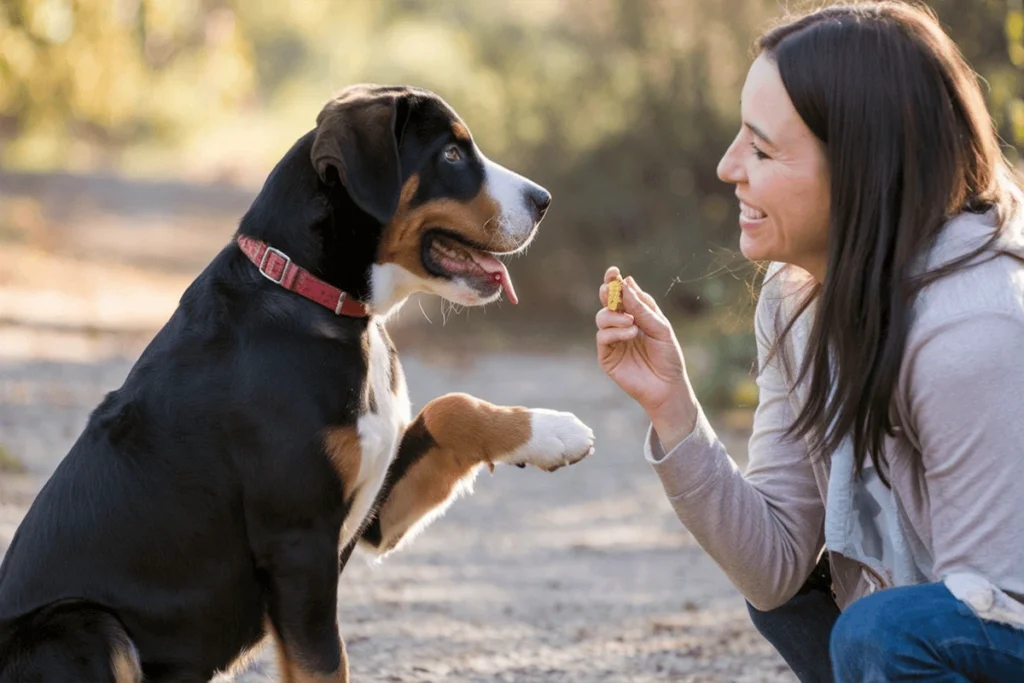
Housebreaking a Greater Swiss Mountain Dog puppy requires consistency, patience, and a well-structured routine. Swissies are intelligent and eager to please, but like all large-breed puppies, they need clear guidance to develop good bathroom habits.
Establish a consistent schedule by taking your puppy outside at the same times every day—first thing in the morning, after meals, after naps, and before bedtime. Puppies thrive on routine, and frequent potty breaks help reinforce where they should relieve themselves. Choose a designated potty spot in your yard and take your Swissy there every time. Using a cue like “Go potty” helps your puppy associate the phrase with the action.
Always reward success immediately. Praise, treats, and affection reinforce good behavior and encourage your Swissy to repeat it. If accidents happen indoors, clean the area thoroughly with an enzyme-based cleaner to eliminate odors that might encourage repeat incidents. Never punish your puppy for accidents—this can create fear and confusion, making housebreaking harder. Instead, redirect them to the right behavior by watching for signs they need to go, such as sniffing, circling, or whining, and taking them outside promptly.
Benefits of Crate Training for a Secure and Comfortable Environment
Crate training provides your Greater Swiss Mountain Dog puppy with a safe, secure space that mimics a natural den. When introduced properly, a crate becomes a comforting retreat where your Swissy can relax and feel protected.
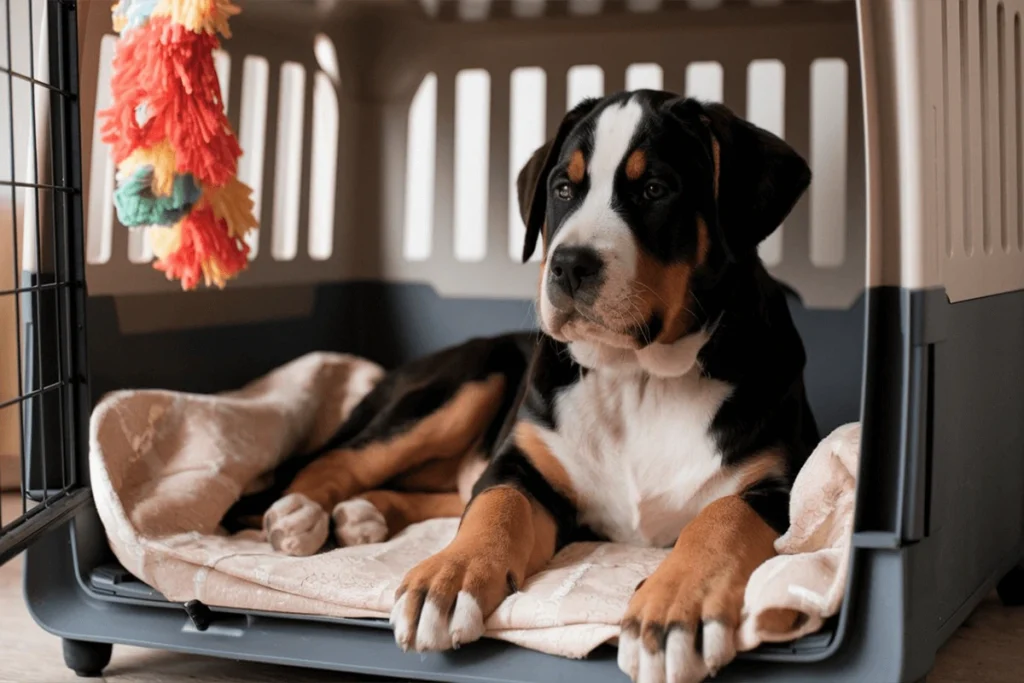
A crate helps with housebreaking by teaching your puppy to hold their bladder since dogs naturally avoid soiling their sleeping area. Use a properly sized crate—large enough for your Swissy to stand, turn around, and lie down comfortably, but not so big that they can use one corner as a bathroom.
Introduce the crate gradually by making it a positive place. Place a soft bed, favorite toys, and treats inside, and allow your puppy to explore it freely. Give your pet their meals in the crate to help them think of it as a good place. Start with short crating periods while you’re home, then gradually increase the time. Never use the crate as punishment—this should be a space your puppy enjoys.
Crate training also prevents destructive behaviors when you’re not supervising. Since Swissies are large, strong, and curious, they might chew on furniture, shoes, or household items if left unsupervised. A crate keeps them safe while helping them develop self-control.
Common Mistakes to Avoid During Potty Training
Many owners unintentionally make housebreaking harder by being inconsistent or using the wrong techniques. Avoid these common mistakes to make the process smoother for your Greater Swiss Mountain Dog puppy:
- Skipping a schedule: Inconsistent potty breaks confuse your puppy. Take them out at the same times every day to establish a routine.
- Not supervising enough: Young puppies need close supervision. If you can’t watch your Swissy, use a crate or a playpen to prevent accidents.
- Punishing accidents: Yelling or rubbing their nose in an accident only creates fear and anxiety. Instead, calmly clean up and reinforce the correct behavior.
- Waiting too long between potty breaks: A puppy’s bladder is small. Even though Swissies are a large breed, they still need frequent breaks, especially when they’re young.
- Ignoring signs your puppy needs to go: Learn to recognize cues like sniffing, circling, or whining, and immediately take them outside.
Housebreaking takes time, but with patience and consistency, your Swissy will learn to go outside reliably. Using positive reinforcement and crate training together makes the process easier, setting your puppy up for long-term success.
Essential Obedience Training for a Well-Behaved Greater Swiss Mountain Dog Puppy
Teaching Basic Commands
Teaching basic commands builds a strong foundation for obedience and strengthens the bond between you and your Greater Swiss Mountain Dog puppy. Since Swissies are intelligent and eager to please, they respond well to structured training, but their independent nature requires consistency and patience.
Start with essential commands like “sit,” “stay,” “come,” “down,” and “leave it.” These commands create structure and help your Swissy understand expectations. Use positive reinforcement by rewarding good behavior with treats, praise, or playtime. Keep training sessions short (5-10 minutes) and fun to maintain your puppy’s focus.
Break each command into simple steps. For example, when teaching “sit,” hold a treat above your puppy’s nose and slowly move it back over their head. As they naturally sit, say “sit” and reward them immediately. Repeat several times until they associate the command with the action.
Consistency is key. Use the same words and hand signals each time, and practice commands in different environments so your Swissy learns to obey, whether indoors, in the yard, or at the park.
Importance of Leash Training for Control and Safety
Leash training is essential for managing a Greater Swiss Mountain Dog puppy, especially as they grow into a powerful, large breed. Without proper leash manners, your Swissy may pull, lunge, or refuse to walk, making walks frustrating or even dangerous.
Start leash training early to prevent bad habits. Introduce the leash indoors by letting your puppy wear it for short periods while giving treats and praise. Once they feel comfortable, practice walking on a leash in a quiet area. Keep the leash loose and encourage them to walk beside you with rewards.
If your Swissy starts pulling, stop walking immediately and wait for them to return to your side. Avoid yanking the leash, as this can create resistance. Instead, use a firm but gentle approach, rewarding them for staying by your side. Teaching the “heel” command reinforces proper walking behavior.
Proper leash training improves safety, giving you control in unpredictable situations. A well-trained Swissy walks calmly, making daily exercise enjoyable for both of you.
Best Methods for Obedience Training for Greater Swiss Mountain Dog Puppy
Obedience training ensures your Greater Swiss Mountain Dog puppy develops into a well-mannered and reliable companion. Because Swissies are a working breed, they thrive on clear leadership, structure, and mental challenges.
Use positive reinforcement training to encourage good behavior. Reward-based training keeps your Swissy engaged and eager to learn. Avoid harsh corrections, which can lead to stubbornness or fear-based behavior. Instead, redirect unwanted actions and reinforce the correct behavior consistently.
Socialization plays a big role in obedience training. Expose your puppy to different environments, people, and other dogs to build confidence and prevent fear-based reactions. Take them to dog-friendly parks, invite friends over, and introduce them to new sounds and experiences.
Training classes can provide additional structure. Enrolling your Swissy in a puppy obedience class helps reinforce commands in a controlled setting with distractions. It also gives your puppy the opportunity to interact with other dogs, improving their social skills.
By staying consistent and patient, you’ll help your Swissy develop strong obedience skills, making them a well-behaved and trustworthy companion.
Socialization: Helping Your Greater Swiss Mountain Dog Puppy Become Confident
Why Socializing a Swissy Puppy Early Is Crucial
Socialization shapes your Greater Swiss Mountain Dog puppy into a well-adjusted, confident, and friendly companion. Since Swissies naturally develop protective instincts, early socialization helps prevent fearfulness, nervousness, or aggression toward unfamiliar people, animals, and environments. A well-socialized Swissy grows into a calm and adaptable adult, making them easier to manage at home and in public settings.
The best time to socialize your Swissy starts between 3 and 14 weeks of age when they absorb new experiences quickly. Puppies who receive positive exposure during this period feel more comfortable in different situations later in life. If you wait too long, your Swissy may become hesitant or overly cautious in new settings, making training and social interactions more challenging.
Early socialization also reduces stress and anxiety in unfamiliar situations. A Swissy that experiences new environments, sounds, and people at a young age handles changes with confidence rather than fear. Whether you plan to take your Swissy on road trips, to the dog park, or for vet visits, proper socialization ensures they remain calm and well-behaved.
How to Introduce Them to New People, Animals, and Environments
Expose your Greater Swiss Mountain Dog puppy to a wide variety of experiences in a positive and controlled manner. The goal is to create positive associations with new people, animals, and places, so your Swissy learns to approach new situations with curiosity rather than fear.
Meeting New People:
- Invite friends and family to interact with your Swissy in a calm, friendly manner. Encourage them to offer treats and gentle petting to create positive experiences.
- Introduce your puppy to different types of people—men, women, children, and individuals wearing hats, glasses, or uniforms—so they learn that people come in all shapes and sizes.
- Avoid overwhelming your puppy. Let them approach new people at their own pace instead of forcing interactions.
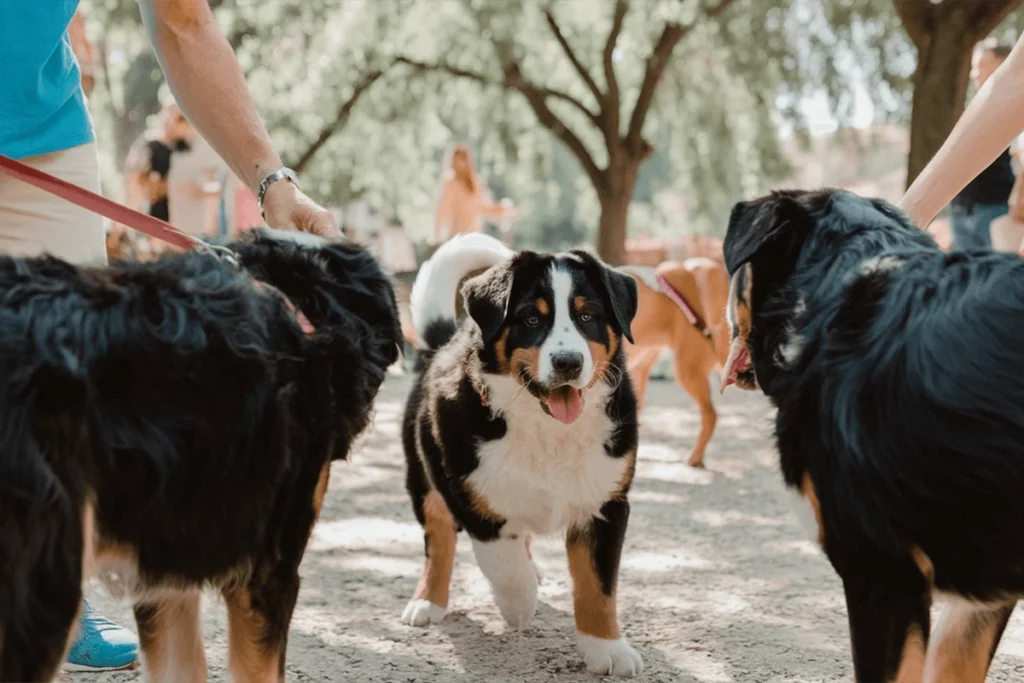
Interacting with Other Animals:
- Arrange controlled playdates with well-behaved dogs to teach your Swissy proper social skills. Choose calm, friendly dogs to ensure positive experiences.
- Expose your puppy to different animals like cats or small pets in a safe, supervised setting. This helps prevent future prey-driven behaviors.
- Watch for signs of stress, such as tucked tails, whining, or excessive licking. If your Swissy seems overwhelmed, give them space and try again later in a calmer environment.
Exploring New Environments:
- Take your puppy on car rides, visits to pet-friendly stores, and walks in different neighborhoods to expose them to a variety of settings.
- Introduce common sounds like doorbells, vacuum cleaners, and passing traffic at a comfortable pace. Reward calm behavior to build confidence.
- Encourage exploration by allowing your Swissy to sniff and investigate new areas while reassuring them with praise.
Tips for Preventing Fear-Based Behavior in a Large Breed Puppy
Fear-based behavior can develop if a Greater Swiss Mountain Dog puppy doesn’t receive proper socialization or experiences negative interactions early in life. Preventing fearfulness ensures your Swissy grows into a well-mannered and stable adult.
- Stay calm and confident. Puppies take emotional cues from their owners. If you react nervously to new situations, your Swissy will sense it and feel uncertain.
- Avoid forcing interactions. Allow your puppy to get used to new things slowly and at their own speed. If they hesitate, encourage them gently but never push them into uncomfortable situations.
- Use positive reinforcement. Reward your puppy with treats and praise when they react calmly to new experiences. This builds confidence and reduces fear.
- Expose them gradually. If your Swissy reacts fearfully to something, remove them from the situation and try again later with a slower approach.
- Be patient. Socialization takes time, and every puppy adjusts at their own pace. Continue introducing new experiences regularly to build their confidence over time.
A well-socialized Greater Swiss Mountain Dog puppy becomes a friendly, adaptable, and confident adult. By prioritizing early socialization and reinforcing positive experiences, you help your Swissy develop into a well-balanced companion ready to handle the world with ease.
Advanced Training and Reinforcement Techniques
Using Positive Reinforcement Training for Long-Term Success
Positive reinforcement training helps your Greater Swiss Mountain Dog puppy develop strong obedience skills and a lifelong eagerness to learn. Since Swissies respond well to rewards, using praise, treats, or play encourages them to repeat good behavior. Unlike punishment-based training, which can lead to fear or stubbornness, positive reinforcement builds trust and strengthens your bond with your puppy.
Use timing and consistency to maximize results. Reward good behavior immediately so your Swissy makes the connection between the action and the reward. If too much time passes, your puppy might not understand what they did right. For example, if your Swissy sits when asked, give a treat or praise within seconds to reinforce the behavior.
Choose high-value rewards based on what motivates your puppy. Some Swissies love food, while others respond better to toys or verbal praise. Rotate rewards to keep training exciting and prevent your puppy from losing interest.
Gradually phase out food rewards as your puppy masters commands. Continue reinforcing good behavior with praise, petting, or play sessions so your Swissy remains engaged in training without relying on treats every time.
How to Reinforce Good Behavior with Consistency and Patience
Reinforcing good behavior requires a steady, patient approach. A Greater Swiss Mountain Dog puppy thrives when they understand clear expectations, but they need time and repetition to learn.
- Stay consistent with commands and rules. Use the same words, gestures, and expectations for every command. If you tell your Swissy “down” one day and “lie down” the next, they may get confused.
- Reward the behavior you want, not the behavior you don’t. If your Swissy jumps on guests, don’t scold or push them away—this still gives them attention. Instead, reward calm greetings with treats or praise.
- Practice commands daily in different settings. Training in the house is a great start, but your puppy needs to follow commands in various locations, including parks, sidewalks, and busy areas.
- Have patience with setbacks. Every puppy has moments when they seem to forget training. If your Swissy regresses, stay calm and reinforce the basics instead of getting frustrated.
Consistency teaches your Swissy that good behavior always leads to positive outcomes, creating a well-mannered and reliable companion.
Training Games and Activities to Keep Your Greater Swiss Mountain Dog Puppy Engaged
Training shouldn’t feel like a chore for you or your Greater Swiss Mountain Dog puppy. Adding fun games and activities keeps your Swissy mentally and physically stimulated while reinforcing obedience.
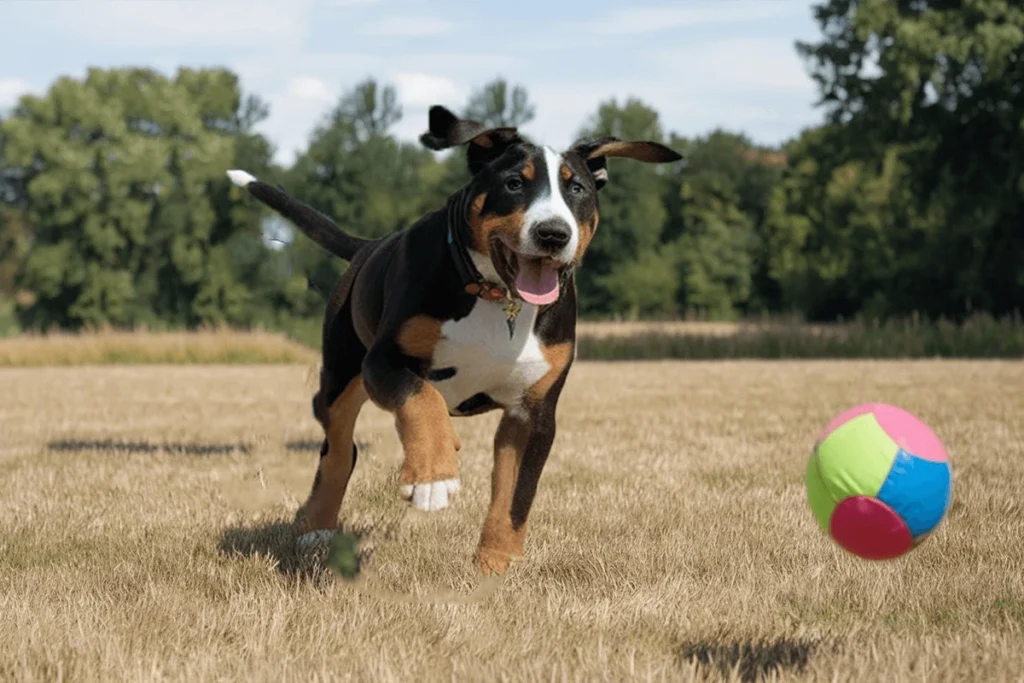
- Hide and Seek: Have your Swissy stay in one place while you hide, then call them to find you. This game strengthens recall skills and builds trust.
- Treat Puzzle Toys: Puzzle feeders challenge your Swissy to solve problems, improving focus and patience while preventing boredom.
- Obstacle Courses: Set up a mini agility course with tunnels, cones, or hurdles to keep training interactive. Swissies enjoy working their bodies and minds.
- Fetch with Commands: Instead of simply throwing a ball, incorporate commands like “sit,” “stay,” or “drop it” before rewarding them with another throw.
- Name Recognition Game: Use different toys and call them by name, encouraging your Swissy to fetch the correct one. This improves focus and listening skills.
Engaging training activities prevent boredom and destructive behaviors. Since Swissies love having a job, structured play and mental challenges help them stay happy and well-behaved.
By using positive reinforcement, staying consistent, and making training fun, you set your Greater Swiss Mountain Dog puppy up for long-term success. A well-trained Swissy becomes a loyal, obedient, and confident companion, ready to thrive in any environment.
Conclusion
Training a Greater Swiss Mountain Dog puppy takes time, patience, and consistency, but the rewards are well worth the effort. A well-trained Swissy becomes a loyal, well-mannered, and confident companion who thrives in a loving home. By focusing on positive reinforcement, early socialization, and structured training routines, you help your puppy develop essential life skills that will benefit them for years to come.
Start with basic obedience training to establish clear expectations and build a strong bond. Teach fundamental commands like “sit,” “stay,” and “come” using rewards and praise to encourage good behavior. Introduce leash training early to ensure safe and enjoyable walks as your Swissy grows into a powerful adult.
Housebreaking and crate training create a structured environment that prevents accidents and helps your Swissy feel secure. Be patient and consistent, rewarding successful potty breaks and using a crate as a positive, comforting space rather than a punishment.
Socialization plays a crucial role in shaping your Greater Swiss Mountain Dog puppy’s temperament. Expose them to new people, animals, and environments in a calm and positive manner to prevent fear-based behaviors. Training games and activities keep your Swissy engaged while reinforcing good manners.
By using consistent reinforcement and interactive training, you help your Swissy develop into a well-adjusted and obedient dog. Training isn’t just about discipline—it’s about building a lifelong partnership based on trust, respect, and mutual understanding.
With dedication and the right approach, your Greater Swiss Mountain Dog puppy will grow into a well-behaved and devoted family member, ready to bring joy and companionship for years to come.
You Can Read More About The Greater Swiss Mountain Dog Here.
You Can Learn More about the Giant Dogs Breeds From Here
Discover His Other Giant Brother “Bernese Mountain Dog“
Find The Best Stuff For your Pet on PetMD Official.
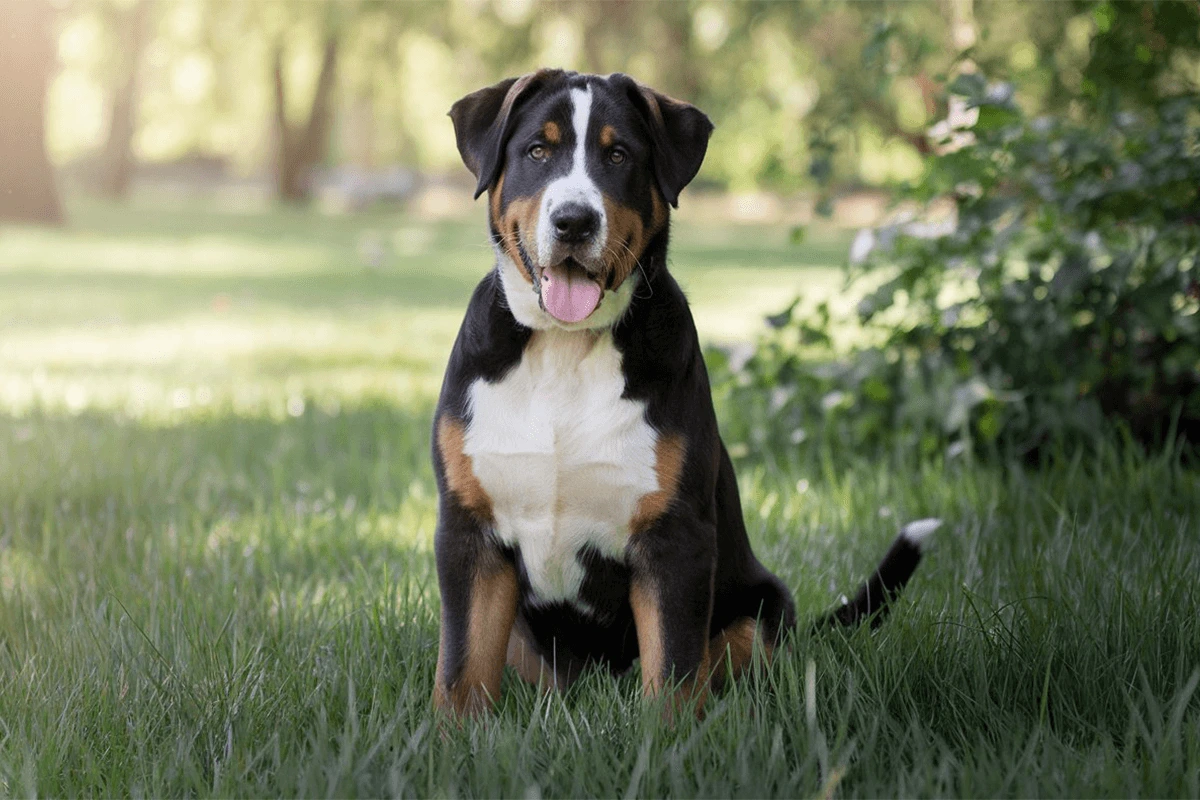
2 thoughts on “Greater Swiss Mountain Dog Puppy:10 Training Tips for a Loyal Pet”
Comments are closed.